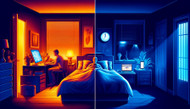From Screen to Sleep: How to Disconnect for a Better Night’s Rest
Posted by Buffy S on 24th Nov 2023
In our hyper-connected world, screens are our constant companions. From the moment we wake up to the last second before we close our eyes, smartphones, tablets, laptops, and TVs demand our attention. This incessant screen time, especially before bed, can significantly disrupt our sleep patterns. But how can we break the cycle for a better night's rest? DealBeds.com explores practical strategies to help you disconnect from screens and reconnect with restful sleep.
Understanding the Impact of Screen Time on Sleep
Before diving into solutions, it’s crucial to understand why screen time affects our sleep. The blue light emitted by screens inhibits the production of melatonin, the hormone responsible for regulating sleep-wake cycles. Consequently, excessive screen time before bed can make it harder to fall asleep and diminish the quality of rest.
Tips to Reduce Screen Time Before Bed
1. Embrace Blue Light Filters
Most devices now come with built-in blue light filters or “night modes” that reduce blue light emission. Activating these settings in the evening can help minimize blue light's impact on your sleep cycle. Make it a habit to switch to night mode at least 2 hours before bedtime.
2. Establish a Tech-Free Bedtime Routine
Create a bedtime routine that promotes relaxation without the need for screens. This might include reading a book, meditating, or doing gentle stretches. The key is to find activities that help you wind down and signal to your body that it’s time to sleep.
3. Set a Screen Curfew
Determine a specific time each evening when you’ll turn off all electronic devices. This curfew should be at least an hour before you plan to go to bed, allowing your mind to unwind and prepare for sleep. It might seem challenging at first, but it becomes more manageable with consistency.
4. Use an Alarm Clock Instead of Your Phone
Many of us use our phones as alarm clocks, which can tempt us to check emails or social media before bed or as soon as we wake up. Switching to a traditional alarm clock can help avoid this temptation and reduce screen time.
5. Charge Devices Outside the Bedroom
Keeping phones, tablets, and laptops out of the bedroom eliminates the temptation to use them before sleep. It also reduces the likelihood of being disturbed by notifications during the night. Charge your devices in another room to help enforce your screen curfew.
6. Mindful Consumption
Be mindful of the content you consume before bed. Avoid stimulating or stressful content that can increase alertness and make it harder to fall asleep. Opt for more relaxing content if you must use screens.
Incorporating Alternative Activities
Replacing screen time with other activities can significantly improve sleep quality. Consider these alternatives:
- Reading: Choose physical books or e-readers that don't emit blue light.
- Journaling: Reflect on your day or plan for tomorrow to calm your mind.
- Relaxing Music or White Noise: These can help soothe you into sleep.
- Mindfulness or Meditation: Techniques to relax the mind and body.
Conclusion
Disconnecting from screens before bed is a vital step toward better sleep and overall health. By establishing tech-free bedtime routines, utilizing blue light filters, and engaging in relaxing activities, we can enhance our sleep quality and wake up feeling more refreshed. Remember, it’s about creating a balance that works for you and your lifestyle. Start tonight, and experience the difference a good night's sleep can make.
For more tips on improving your sleep environment, visit us at DealBeds.com. Here’s to healthier, more restful nights ahead!

